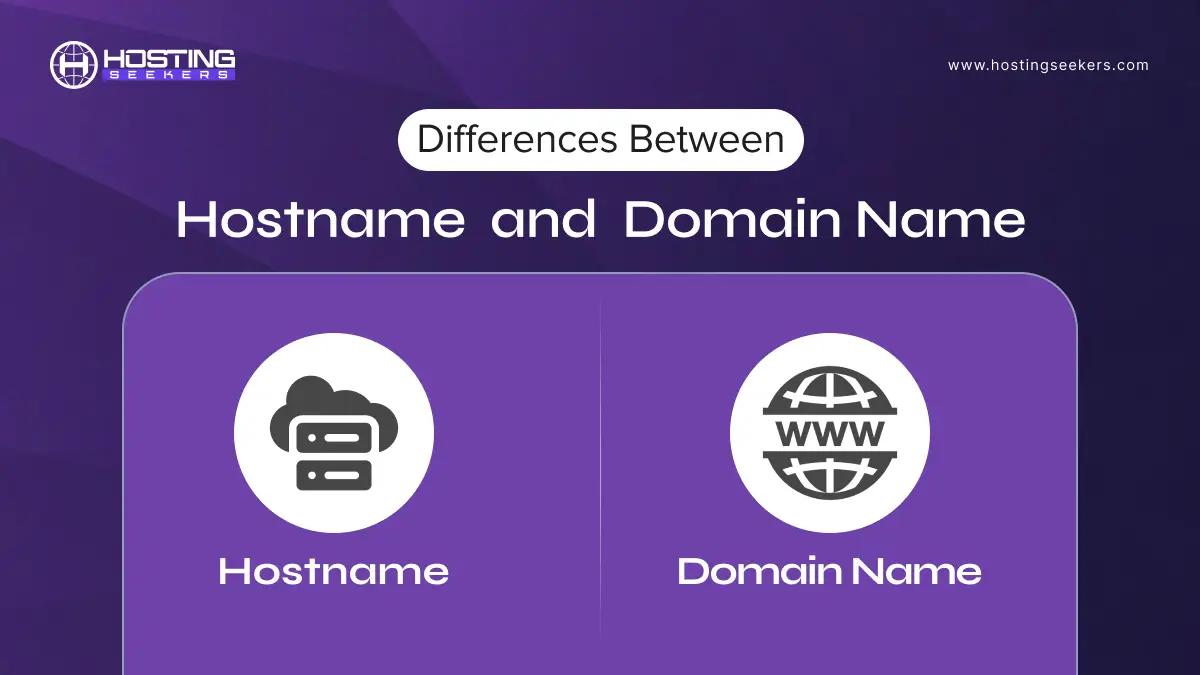
Hostname vs Domain Name: What’s the Difference
IT Published on : September 1, 2025Many People think that Hostname is a similar concept to the domain name. However, both the Domain name and Hostname are closely related; they serve different purposes in how computers and users access websites.
A domain name is the human-readable address of a website, like abc.com, that makes it easy for users to find and remember online destinations. A hostname, on the other hand, identifies a particular device or services within a domain, for instance, mail.abc.com or server1.example.com
Therefore, understanding the difference between the two is vital for anyone managing websites, servers, or online services, as it impacts configuration, accessibility, and networking. To help you understand, we have covered a detailed blog on Hostname vs Domain Name. Let’s get started.
What is a Hostname?
In computer terms, a hostname is a label assigned to a device connected to a computer network. It’s utilized to identify the device for local use, as well as on the Internet. When used locally, the hostname can be mycomputer, which can be an Active Directory part or an internal domain like mycomputer.abc.com.
On the internet, hostnames belong to a domain in the public Domain Name System (DNS), which maps them to IP addresses. of the host for mapping the hostname to an address.
Advantages of Hostnames
- Human-Readable: Hostnames are easier for people to remember than numerical IP addresses.
- Better Organization: They help identify devices, servers, and services within a network (e.g., mail.example.com, ftp.example.com).
- DNS Integration: Work with the Domain Name System (DNS) to translate names into IP addresses automatically.
- Flexibility: A single hostname can be mapped to multiple IP addresses (useful for load balancing).
- Branding: Meaningful host names can represent services or departments (e.g., support.company.com).
- Easier Network Management: Simplifies administration, troubleshooting, and communication across devices.
- Consistency: Even if an IP address changes, the hostname can remain the same, avoiding confusion.
Disadvantages of Hostnames
- DNS Dependency: Hostnames rely on DNS servers for resolution; if DNS fails, the hostname won’t work.
- Slight Delay: Resolving a hostname to an IP can introduce a small latency compared to direct IP use.
- Complex Management: Large organizations may need to maintain thousands of host names, which can get complicated.
- Conflicts: Duplicate or misconfigured hostnames in a network can cause accessibility issues.
- Security Risks: Attackers can exploit hostname resolution (DNS spoofing, hijacking, phishing).
- Not Always Unique Globally: Unlike IP addresses, hostnames need a DNS structure to ensure uniqueness across the internet.
- Case Sensitivity Issues: Some systems treat hostnames inconsistently if not configured properly, causing confusion.
What is a Domain Name?
A domain name is the address that people type in the browser’s URL to visit your WordPress website. For example, the domain name of HostingSeekers is HostingSeekers.com, and you can see it in the URL of this page.
In simple terms, let’s assume your house is a website and your address is the domain name that helps people visit your website. Today, there are around 762 million domains available on the internet.
Advantages of Domain Name
- Professionalism & Trust: A unique domain name makes your website look more credible compared to free subdomains (like yoursite.wordpress.com).
- Brand Identity: Helps in building and strengthening your brand presence online.
- SEO Benefits: Relevant keywords in a domain can improve search engine rankings.
- Memorability: Short, catchy domain names are easier for customers to remember.
- Email Personalization: You can create professional email addresses (e.g., [email protected]).
- Ownership & Control: You own the name and control how it’s used, unlike social media handles.
- Global Reach: With a domain, your website is accessible worldwide, making it easier to expand your business.
Disadvantages of Domain Name
- Cost: Domain registration and renewal require ongoing expenses, especially for premium domains.
- Availability Issues: Many good domain names may already be taken, forcing you to compromise.
- Maintenance: Requires timely renewal to avoid losing ownership.
- Trademark Conflicts: Choosing a name too close to a registered brand can cause legal issues.
- Dependency on Hosting: A domain alone won’t work; you still need hosting to make your site live.
- Potential Hacking Risks: Domains can be targeted for phishing, hijacking, or DNS attacks if not secured.
- Time Investment: Finding the right domain that fits your brand and is available can be time-consuming.
Hostname vs Domain Name: Comparison Table
| Hostname | Domain | |
| Examples | Mail.google.com, ftp.abc.org | HostingSeekers.com |
| Character Length | Each label can be 1–63 characters, and the full hostname (including dots) must not exceed 253 characters. | Each label (like example) can be 1–63 characters, and the full domain name (including TLD) must not exceed 253 characters. |
| Structure | Can include multiple labels (e.g., mail.example.com) where mail is the hostname. | Consists of top-level domain (TLD) + second-level domain e.g., google.com |
| Use Case | Used for identifying and connecting to specific devices or services in a network. | Used for branding, accessing websites, and mapping IP addresses globally. |
| DNS | Hostname is mapped to an IP address through DNS. | A domain is the registered name in DNS, which can have multiple hostnames (subdomains). |
| Visibility | Often used internally within networks, but can also be visible online (as subdomains). | Publicly visible and represents the website identity. |
| Price | Mostly free to assign | Includes the domain registration cost |
| Security | It can be part of internal network security | It includes various internet-wide security concerns. |
Hostname vs Domain Name: Hierarchy
The hostname is always a subset of the domain name. It comes before the domain and points to a specific part of it. For example, in blog.example.com, “blog” is the hostname under the main domain example.com.
The domain name, however, sits higher in the hierarchy and can include multiple hostnames like mail.example.com, ftp.example.com, or shop.example.com.
Hostname vs Domain Name: Usage
A hostname is used to locate and connect to a specific device or service within a domain. It tells the system exactly which server or service is being requested, such as a mail server, a file transfer server, or a blog platform.
A domain name, on the other hand, is designed to make it easy for people to access websites without needing to remember complicated IP addresses. It represents the entire identity of a website and directs users to the right place online.
Hostname vs Domain Name: Format
A hostname usually appears as a single label or word. Examples include mail, ftp, server1, or blog.
A domain name always consists of a name and an extension, such as example.com, openai.org, or wikipedia.net. When combined with a hostname, it forms a fully qualified domain name (FQDN), such as mail.example.com.
Hostname vs Domain Name: Scope
The scope of a hostname is narrow because it refers to one specific device or service. Each hostname within a domain is unique and points to a different part of the network.
The scope of a domain name is broad, as it represents the overall online identity of a business or organization. It can have many host names under its umbrella, each serving a different function.
Conclusion
Hostname vs Domain: A hostname identifies a specific device or server within a network, while a domain name serves as the human-readable address of a website on the internet. Simply put, the domain name points users to a website, and the hostname pinpoints the exact machine or service within that domain. Together, they work hand-in-hand to make internet navigation easier and more structured
Frequently Asked Questions
Q 1. Is a Hostname the same as a domain name?
Ans. No, a hostname is not the same as a domain name. A hostname identifies a specific device or server on a network, while a domain name represents the overall website address that users type into a browser.
Q 2. Can a Domain name be a Hostname?
Ans. Yes, a domain name can also act as a hostname when it points directly to a server. For example, example.com can be both the domain and the hostname if it refers to the main server of that domain.
Q 3. What is an example of a Hostname?
Ans. An example of a hostname is mail.google.com, where “mail” is the hostname and google.com is the domain.
Q 4. What is the difference between a URL and a domain name?
Ans. A domain name is just the web address (e.g., example.com). A URL (Uniform Resource Locator) is the full web address, including the domain name, plus protocol and path.
Q 5. Do I need both a domain name and a hosting provider?
Ans. Yes, you need both. The domain name is your website’s address, while the hosting provider stores your website’s files and makes them accessible online. Without hosting, your domain has no content; without a domain, people won’t have an address to find your website.




